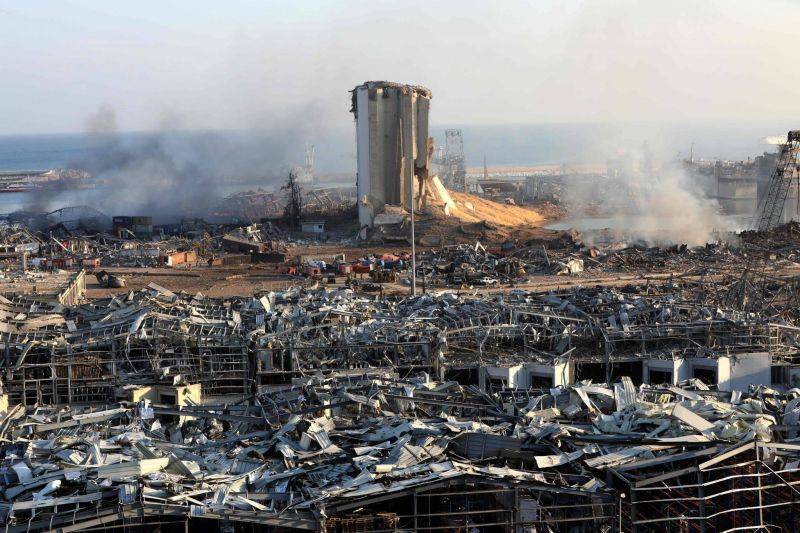
The port of Beirut, devastated by the explosion of Aug. 4, 2020. (Credit: Anwar Amro/AFP archives)
The Beirut Bar Association, which represents a number of people impacted by the Aug. 4 Beirut port explosion, filed a request to remove acting public prosecutor Ghassan Khoury from the blast investigation.
The request was filed Monday before the sixth chamber of the Court of Cassation presided over by Randa Kfoury. In the event that the court finds that Khoury’s neutrality in the investigation is compromised, it could remove and replace him with another magistrate.
In December 2020, Khoury replaced Ghassan Oueidat, the country’s chief prosecutor, in the Beirut port explosion probe. The latter had recused himself, citing kinship with MP Ghazi Zeaiter, one of those charged in the case.
“The Bar Association considers that Ghassan Khoury is not leading the case in an objective and speedy manner, as he should be, especially since it is a case that resulted in hundreds of deaths, and thousands of injuries,” said a lawyer who is well-informed about the process undertaken by the association chaired by Melhem Khalaf.
The lawyer added, “This is why the Bar Association requested the chamber of the Court of Cassation in charge of ruling on the magistrates’ neutrality to examine all the actions taken by the prosecutor in order to ensure they are in conformity with the prosecution’s role, namely the [fair] representation of the Lebanese citizens.”
Another lawyer, who also requested anonymity, explained to L’Orient-Le Jour that, “the Bar Association’s request is not a complaint against the prosecutor, but an expression of doubt as to his impartiality.”
“Instead of spearheading [legal] actions against anyone implicated in the crime, Mr. Khoury has been trying to spare senior officials from accountability,” the lawyer added.
He deplored the fact that “the prosecutor did not file a complaint before Judge Bitar against the former ministers who are involved in the case. He also did not stand up against caretaker Interior Minister Mohamed Fehmi when he refused a summons for Abbas Ibrahim, the director-general of General Security, to be questioned, or when the Higher Defense Council did not allow the interrogation of Tony Saliba, the director general of State Security.”
Those close to Khoury argue that Parliament is the competent authority to indict the former ministers who are implicated in the case, because they are accused of charges resulting from negligence in performing their duties.
This is in direct conflict with the argument put forth by the lead investigator in the Beirut port probe, Judge Tarek Bitar, who believes that the implicated ministers must be tried before criminal courts, given the gravity of the crime.
A crime in itself
The aforementioned lawyer also spoke of alleged “negligence” on Khoury’s part.
“When he was still in his post as advocate-general at the Court of Cassation, Khoury failed to follow up on a report on an enormous quantity of ammonium nitrate [in the port],” he said, stressing that “he should have opened an investigation into the very presence of this explosive material, regardless of the occurrence of the explosion.”
He went on saying that Khoury “should have considered that storing these dangerous chemicals in the middle of the city is a crime in itself. Ammonium nitrate must be stored in an army warehouse, under the supervision of the Defense Ministry.”
At the time, the Public Prosecution only ordered that work be done to fill in a hole in the wall of Warehouse 12, ground zero of the explosion.
On the procedural level, the Court of Cassation “must first notify Ghassan Khoury of the request lodged against him, as well as the parties implicated in the case, in Lebanon and abroad,” explained the lawyer, adding “that the court must wait 10 days from the last notification before ruling on the merits of the case.”
“Upon the notification, Khoury will have 10 days to respond. The Court of Cassation would issue a ruling at the end of the 10-day period, even if it has not received any response from the prosecutor,” he added.
“In the meantime, the court would have requested the investigative judge at the Court of Justice, Tarek Bitar, to provide it with the probe’s documents and files to verify whether or not Mr. Khoury is representing the citizens in good faith,” the lawyer said.
He noted, “until a judgement is made, the prosecutor is not legally bound to suspend his duties just because he is the subject of suspicion, unless the Court of Cassation decides otherwise.”
A source close to the Public Prosecution told L’Orient-Le Jour that Khoury does not intend to stop working until a judicial decision is made to this effect.
The same source criticized the Bar Association’s request to remove Khoury, arguing that he is a party to the Beirut port case and not in charge of it.
This article was originally published in French in L’Orient-Le Jour. Translation by Sahar Ghoussoub.